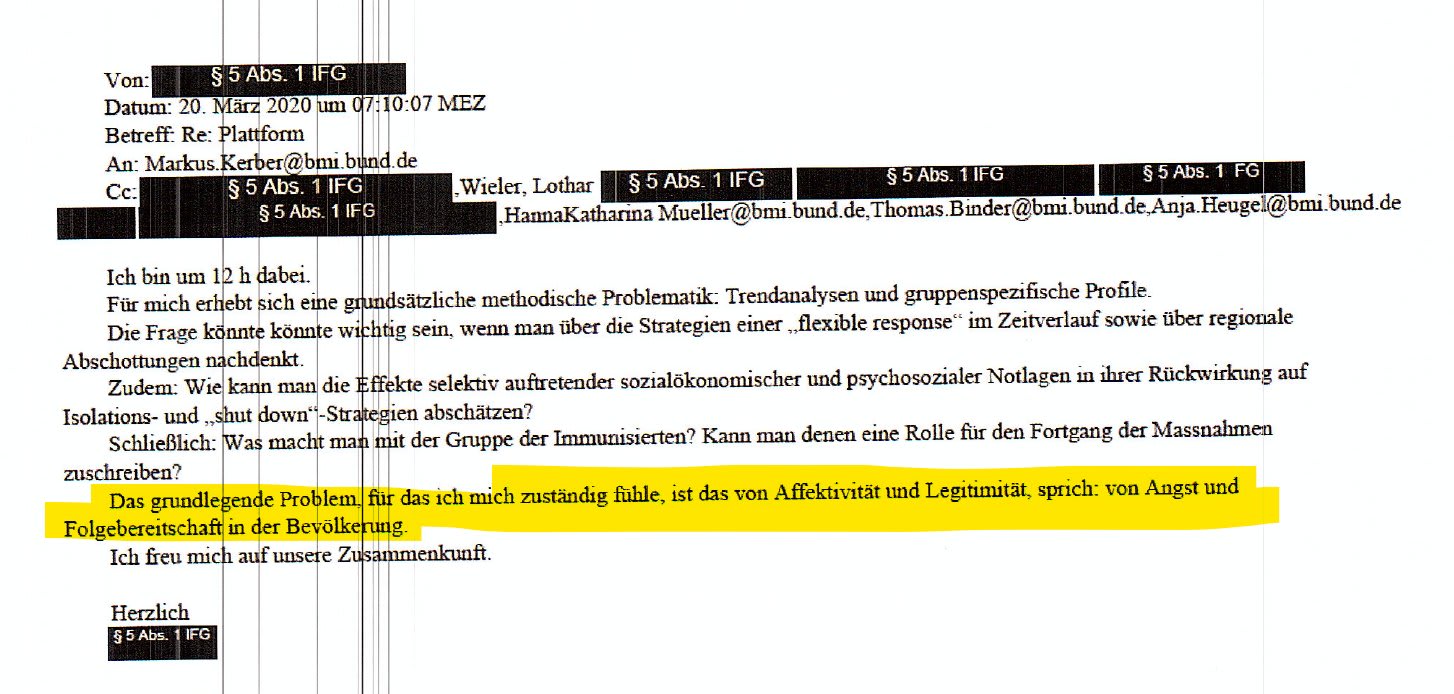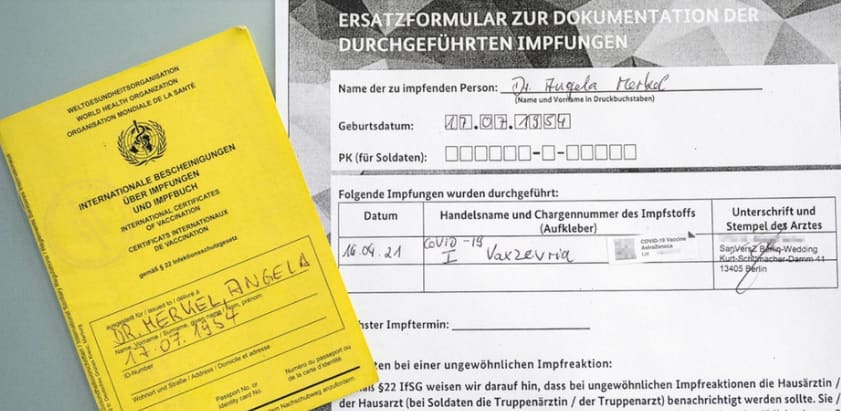From the original article on November 25, 2021. Author: eugyppius.
I’ve mentioned this episode a few times: On 11 March 2020, Angela Merkel held a press conference where she remarked that the best hope was to slow the spread of SARS-2, and that 70% of Germans could be infected. The Italian lockdown was only a few days old, and it was plainly not Merkel’s intent to go down the path of mass containment. The United Kingdom, Germany, Sweden and likely a few other countries too still planned for an ordinary approach to Corona, with minimal mitigations.
All the while, though, Team Lockdown was hard at work behind the scenes, to bend policy in their direction. As this leaked email from 20 March shows, German medical bureaucrats deputised by the Ministry of the Interior were soon consulting experts on how best to instil “fear and a willingness to obey in the population.”

Because Western governments doubted their capacity to enforce Chinese-style lockdowns, fomenting mass panic became a non-pharmaceutical intervention in its own right. The histrionic media messaging has continued to this day, and it has contributed to a profoundly important division in our society: There are on the one hand those people in essential roles, who have endured exposure to Corona from the beginning, and most of whom have had the virus by now. And there are on the other hand those in Martin Kulldorf’s “laptop class,” that is to say well-off urban professionals, who have spent most of the last 21 months at home, hiding from a virus that many of them believe is approximately as dangerous as SARS. Mass infections among these people are only starting to happen right now.
As members of this privileged, sheltered class, politicians and bureaucrats have absorbed the virus hysteria that they helped seed in their social milieu. In the beginning, Merkel did not especially fear the possibility of mass infections in Germany. Six months of press hysteria later, in October 2020, she had grown accustomed to carrying two plastic envelopes in her bag. One was for the careful, hygienic disposal of used surgical masks. The other carried precious new ones, whenever she judged her current mask had reached a dangerous state of virus saturation.
Press photographs captured her awkward mask-changing routine:

Merkel’s remarkable virus paranoia, quietly acknowledged by the press now for months, explains her fixation on social isolation, closures and curfews as the only acceptable pandemic policies.

She is a 67 year-old sedentary woman who likely suffers from one or more undisclosed health problems. And she is surrounded by other older, unfit government officials, like 73 year-old interior minister Horst Seehofer, who nearly died of a B19 virus infection in 2002, and so has a reason to fear viral infection. For months and months, all of these people have been taking every possible personal precaution – including house-arresting the entire domestic populations of the countries they govern – in the vain hope of escaping Corona.
You could feel their collective relief when the vaccines were rolled out. All of them eagerly accepted vaccination. Merkel even provided pictures of her personal yellow vaccine pass to the press, with the stamp documenting her first dose of AstraZeneca. (Her purpose, in part, was to allay public concerns over the propensity of AstraZeneca to cause blood clots.)

To the profound disappointment of Merkel and everybody like her, the vaccines have not eradicated Corona. Every day, the prospect of personal infection looms for these people as a new, uncomfortable certainty. Every day, they and the rest of the work-from-home bureaucracy become ever more terrified. The prime minister of Austria is so afraid that he has confined all unvaccinated Austrians to their homes. When asked, he declared that this measure would have no end date. The Chief Minister of Australia’s Northern Territory is terrified. New Zealand prime minister Jacinda Ardern is terrified.
You know who isn’t terrified right now? Everyone outside these circles. I and many of the people I know have had Corona, and we’re not terrified. Blue-collar workers have mostly been infected, and they’re not terrified. Grocery clerks, nurses, police officers and bus drivers aren’t terrified. All of the terror is at the top, blaring down at us all of the time. All these people know they are going to get sick in the next few months, and they are railing against this reality.
*
While I don’t agree with James Lindsay, that we are on the verge of a Second Enlightment, I think his distinction between official, curated, peer-reviewed information and analysis; and counter-cultural internet hive-mind information and analysis, is instructive.
All in all, it is the hive-mind that has been vastly more successful at understanding what is going on – not only as far as Corona, but everywhere. This has been obvious now for years. It is even true in my own field, where the official discourse suffers from a pervasive, unoriginal banality, while alternative theories pondered by intelligent outsiders and anonymous Twitter accounts become every day vastly more interesting. The reasons are simple: There are more people involved; the barriers to publishing are lower; nodes that provide bad analysis are easily removed; the thinkers are more thoroughly networked to each other; they gather audiences solely on the basis of their ability; they consider everything, not just the official line.
Meanwhile, it is only official, curated information that is allowed to inform bureaucratic decisions. Products of the hive-mind are deliberately excluded, via gate-keeping mechanisms like peer review and credentialism. All of the terrified Angela Merkels of the world act within an environment of outdated, poor-quality information, all the time.
Again, this is not unique to Corona. In an interview I will never find again, someone asked Noam Chomsky about the failures surrounding the American debacle in Afghanistan. He responded that it was above all a reflection of the distorted and inaccurate intelligence assessments that pollute the thought of American foreign policy planners and military strategists. Random people on the internet, he said, had a better view of the situation from the start.
Exactly the same phenomenon plagues official responses to Corona. The problem with curated information isn’t just that it is slow, subject to inertia, and produced by insular out-of-touch functionaries. Because the information has political importance, there are incentives everywhere to manipulate and degrade its quality. Bureaucratic actors will lie about what is going on to curry favour, save face or evade blame. What is more, many advisers, analysts and modellers are only in the position of providing analysis in the first place, because we need more women in STEM, or because they tell the Faucis of the world what they want to hear, or because they have the right combination of sociopathy and narrow-mindedness necessary to ascend complex bureaucratic hierarchies.
Corona policies really are as stupid as they look. Politicians and bureaucrats have locked themselves into a sad parody of the film Contagion, and their increasingly unsustainable, erratic behaviour merely reflects their desperation.
Library of Chadnet | wiki.chadnet.org